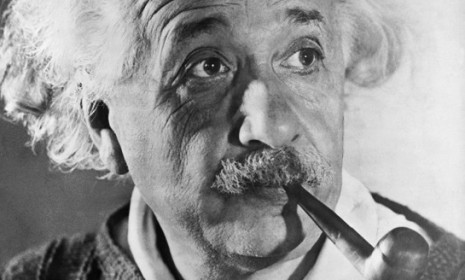Particles that move faster than light: Was Einstein wrong?
Physicists shock the science world by announcing that neutrinos can travel faster than light — upsetting a key pillar of modern physics

A free daily email with the biggest news stories of the day – and the best features from TheWeek.com
You are now subscribed
Your newsletter sign-up was successful
Albert Einstein sits atop the pantheon of scientists because of his seminal theory of relativity — but new research from scientists working in Switzerland and Italy suggests that Einstein might have been wrong. OPERA, an international group of physicists at CERN's particle accelerator outside Geneva, claim to have tested neutrinos traveling faster than the speed of light — which Einstein maintained is the fastest thing in the universe. What exactly did the physicists find, and what are the implications? Here's what you should know:
What are neutrinos?
Neutrinos are virtually invisible, shape-shifting particles. They're "among the weirdest denizens of the weird quantum subatomic world," says Dennis Overbye in The New York Times. And they travel effortlessly "through walls and planets like wind through a screen door." Over three years, the OPERA team fired 15,000 beams of neutrinos underground from CERN to the subterranean Gran Sasso laboratory south of Rome — primarily to study the shifting properties of neutrinos, not the speed at which they travel. But their speed "is becoming a main issue," says OPERA leader Antonio Ereditato, dryly.
The Week
Escape your echo chamber. Get the facts behind the news, plus analysis from multiple perspectives.

Sign up for The Week's Free Newsletters
From our morning news briefing to a weekly Good News Newsletter, get the best of The Week delivered directly to your inbox.
From our morning news briefing to a weekly Good News Newsletter, get the best of The Week delivered directly to your inbox.
How much faster than light did the neutrinos travel?
Light travels the 454 miles from CERN to Gran Sasso in 2.4 thousandths of a second, and the neutrinos beat that time by 60 nanoseconds, or 60 billionths of a second, the scientists say. "You could say it's peanuts, but it's not," says Ereditato, "It's something that we can measure rather accurately with a small uncertainty."
How does this challenge Einstein?
Einstein's 1905 special theory of relativity states that c, the speed of light, is a sort of "cosmic speed limit" — that nothing in the universe moves faster than light, which travels at 186,282 miles per second. That idea is a key foundation of modern physics, and it has withstood more than 100 years of intense scrutiny.
A free daily email with the biggest news stories of the day – and the best features from TheWeek.com
Could the OPERA team be wrong?
The OPERA team spent six months trying to find holes in its research, but "the finding is so startling that, for the moment, everybody should be very prudent," says Ereditato. "The correct attitude is to ask oneself what went wrong," says CERN theoretical physicist Antonio de Rujula, who suspects human error is responsible for the shocking result.
And what if Einstein is wrong?
The biggest implication might be that time travel would be theoretically possible. The average person "could, in principle, travel to the past and kill their mother before they were born," says De Rujula. For his part, Ereditato is avoiding dwelling on what the demotion of light could mean. "We will continue our studies and we will wait patiently for the confirmation," he says. "Everybody is free to do what they want: To think, to claim, to dream." At least for now, he adds, "I'm not going to tell you my dreams."
Sources: Associated Press, New York Times, Reuters
-
 The Week Unwrapped: Do the Freemasons have too much sway in the police force?
The Week Unwrapped: Do the Freemasons have too much sway in the police force?Podcast Plus, what does the growing popularity of prediction markets mean for the future? And why are UK film and TV workers struggling?
-
 Properties of the week: pretty thatched cottages
Properties of the week: pretty thatched cottagesThe Week Recommends Featuring homes in West Sussex, Dorset and Suffolk
-
 The week’s best photos
The week’s best photosIn Pictures An explosive meal, a carnival of joy, and more